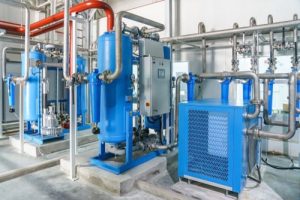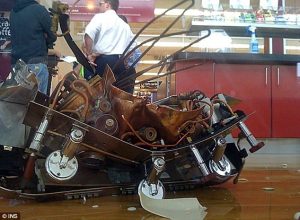Restarting Workplace Pressure Systems Safely

This guidance is for employers who use pressure systems in their workplace including those working in manufacturing, and in businesses such as cafés and dry cleaners.
If pressure systems have not been used for an extended period of time, they may become unsafe.
What are workplace pressure systems?
Pressure systems can be standalone or part of individual machines, processes and site (ancillary) services and include:
- Steam boilers
- Air compressors and receivers
- Industrial refrigeration systems
- Hydraulic cylinders for vehicle and passenger lifts
- Articulated jibs
There are also steam reservoirs in some café boilers, steam cleaners and solvent recovery vessels forming part of dry cleaning (and similar) processes.
Examination period
If pressure systems forming part of machinery have exceeded their examination period, you should get the agreement of a competent advisor before restarting the machine.
Safety issues
There are safety issues from contamination of fluids and/or gases generated that can cause unexpected behaviour of the pressure elements of machinery leading to unintended outcomes, such as:
- Water ingress – condensate forming in steam vessels due to external temperature changes, causing violent energy exchange (possible explosion).
- Air ingress – due to seal degradation on hydraulic cylinders, etc permitting air to be drawn leading to creep or unintended movement of mechanical parts.
- Internal structural corrosion – particularly from cooling of steam systems, forming pooling of condensate in the base of vessels.
- Bypass of safety devices – is possible following incorrect re-assembly of pipework after cleaning (in particular, explosion can occur when solvents are involved).
Restarting a pressure system safely
It is recommend by the Health and Safety Executive that you should regard the start-up of all pressure systems forming part of machinery as a functional pressure test and that you take the safety precautions detailed in the following information link- guidance note on safety requirements for safety testing.
Starting up any pressure system from cold can significantly affect the mechanical behaviour of vessels, pipework and moving parts. For example:
- Steam systems should be gradually warmed through to prevent cracking of steel or cast-iron components.
- Pressure relief valves contain mechanical spring mechanisms. There is potential that these may have seized or fatigued as a result of a constant level of compression over a period of time. It is recommended that you closely inspect and test safety devices like these. If you have any concerns, replace them. (i.e., a new one that has relevant certificates)
Coffee machine explosion as a result of failure of the pressure relief valve

Hydraulic fluids will be more viscous when cold. Often, parts appear to move more sluggishly and there can be a time delay in response to operating controls. Where hydraulic systems have been left switched on, continuous recirculation can result in significant increase in temperature of the fluid. Unintended release or hose failure would result in hot oil being sprayed out.